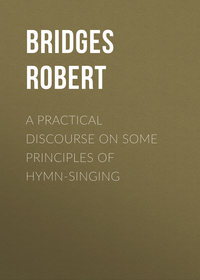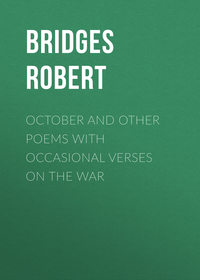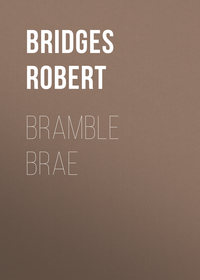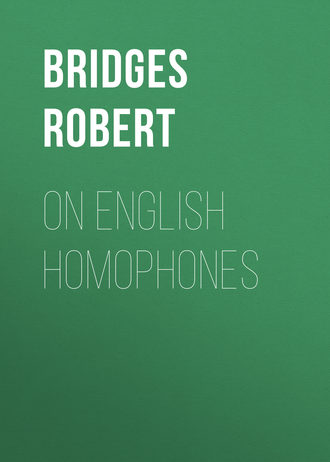 полная версия
полная версияOn English Homophones
Mauling of words.
As no one will deny that homophones are to be made by mauling words, I will begin by a selection of words from Mr. Jones' dictionary showing what our Southern English is doing with the language. I shall give in the first column the word with its literary spelling, in the second Mr. Jones' phonetic representation of it, and in the third column an attempt to represent that sound to the eye of those who cannot read the phonetic script, using such makeshift spellings as may be found in any novel where the pronunciation of the different speakers is differentiated.
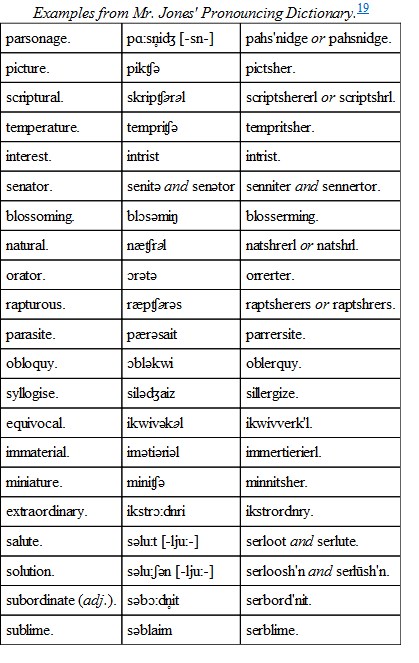
19The dictionary allows mitigated variants of some of these words.
In culling these flowers of speech I was not blind to their great picturesque merits, but they must not be taken for jokes, at least they must not be thought of as conjuring smiles on the faces of Messrs. Jones, Michaelis and Rippmann: they are deadly products of honest study and method, and serious evidence whereby any one should be convinced that such a standard of English pronunciation is likely to create homophones: and yet in searching the dictionary I have not found it guilty of many new ones.19 For examples of homophones due to our 'standard' speech one might take first the 20 wh– words (given on page 14) which have lost their aspirate, and with them the 9 wr– words: next the 36 words in table iv and note, which have lost their trilled R: and then the 41 words from table vi on page 15; and that would start us with some 100 words, the confusion of which is due to our Southern English pronunciation, since the differentiation of all these words is still preserved in other dialects. The differentiation of these 100 words would of course liberate their twins, so the total number of gains should be doubled.
Example of one class.
But number is not so important as the quality and frequency of the words involved, so I will instance one class in detail, namely the words in which aw and or are confused. Here are a dozen of them:
core = caw.
door = daw*.
floor = flaw*.
hoar* = haw.
lore* = law.
more = maw*.
oar, ore = awe*.
pore = paw.
roar = raw.
soar, sore = saw, saw.
tore = taw.
yore* = yaw.
Of these 12 words, 6 exhibit stages or symptoms of obsolescence. I should think it extremely unlikely that yore has been in any way incommoded by yaw; and flaw, which is now more or less cornered to one of its various meanings, was probably affected more by its own ambiguities than by floor; but others seem to be probable examples: shaw and lore, and I think maw, are truly obsoletes, while hoar and daw are heard only in combination. Awe is heard only in awful, and has there lost its significance. I should guess that this accident has strengthened its severity in literature, where it asserts its aloofness sometimes with a full spelling [aweful] as in speech two pronunciations are recognized, awful and awf'l.
Now how do these words appear in Jones' dictionary? If there is to be any difference between the aw and ore sounds either the R must be trilled as it still is in the north, or some vestige of it must be indicated, and such indication would be a lengthening of the o (=aw) sound by the vestigial voicing of the lost trill, such as is indicated in the word o'er, and might be roughly shown to the eye by such a spelling as shawer for shore [thus shaw would be ʃɔ: and shore would be ʃɔ:ə] and such distinction is still made by our more careful Southern English speakers, and is recognized as an existent variant by Jones.
Since the circumflex accent properly indicates a rise and fall of voice-pitch on a vowel-sound such as almost makes a disyllable of a monosyllable (e.g. in Milton's verse the word power may fill either one or two places in the line) I will adopt it here to denote this fuller and differentiating pronunciation of ore.
Now to all these words, and to the finals of such words as ad[ore], impl[ore], ign[ore], Jones gives the diphthongal aw as the normal South English pronunciation, and he allows the longer [ore] sound only as a variant, putting this variant in the second place.
Hence, all these [ore] words are being encouraged to cast off the last remnant of their differentiation, which it is admitted that they have not yet quite lost.20
6. That the mischief is being propagated by phoneticiansThe use of phonetics in education.
The phoneticians are doing useful work in supplying an educational need. By the phonetic system any spoken language can now be learned quickly and easily, just as by the sol-fa system the teaching of music was made easy and simple. If a clergyman who had no practical knowledge of music were offered the post of minor canon in a cathedral, he would find it very difficult to qualify himself passably, whereas any village schoolboy could learn all the music necessary for such an office, and learn that solidly too and soundly and durably, in a few lessons, truly in a few hours, by the sol-fa method. The principle is the same in music and in speech, namely to have a distinct symbol for every separate sound; in music it is a name, the idea of which quickly becomes indissociable from the note of the scale which it indicates; in phonetics it is a written letter, which differs from the units of our literary alphabet only in this, that it has but one meaning and interpretation, and really is what all letters were originally intended to be. When you see it you know what it means.
Its general adoption certain.
The principle is but common sense, and practice confirms its validity. I am persuaded that as soon as competition has exposed the advantages which it ensures, not only in the saving of time, but in the rescuing of English children from the blighting fog through which their tender minds are now forced to struggle on the first threshold of life,21 then all spoken languages will be taught on that method. What now chiefly hinders its immediate introduction is not so much the real difficulty of providing a good simple system, as the false fear that all our literature may take on the phonetic dress; and this imagination is frightful enough to be a bugbear to reasonable people, although, so far as one can see, there is no more danger of this result than there is of all music appearing in sol-fa notation.
Demand of the market.
Now here is a promising field for adventure. Not only is the creation of a new fount of type an elaborate and expensive process, but the elaboration of a good system and its public recognition when produced involve much time; so that any industrial company that is early in the market with a complete apparatus and a sufficient reputation will carry all before it, and be in a position to command and secure great monetary profit.
There is no doubt that the field is now strongly held by the Anglo-Prussian society which Mr. Jones represents.22
In the preceding section Mr. Jones' dictionary was taken as authority for the actual condition of Southern English pronunciation. It must now be considered in its other aspect, namely as the authoritative phonetic interpretation of our speech; my contention being that it is a wrong and mischievous interpretation.
It is difficult to keep these two questions quite apart. The first, which was dealt with in Section 5, was that Southern English is actively productive of homophones. This present Section 6 is contending that the mischief is being encouraged and propagated by the phoneticians, and Mr. Jones' books are taken as an example of their method.
Fault of Mr. Jones' method.
The reason why the work of these phoneticians is so mischievous is that they have chosen too low a standard of pronunciation.
The defence that they would make would be something like this.
They might argue with some confidence, and not without a good show of reason, that the actual 'vernacular' talk of the people is the living language of any country: they would allege that a spoken language is always changing, and always will change; that the actual condition of it is the only scientific, and indeed the only possible basis for any system of tuition; and that it is better to be rather in advance of change than behind it, since the changes proceed inevitably by laws which education has no power to resist, nay, so inevitably that science can in some measure foresee the future.
This would, I suppose, fairly represent Mr. Jones' contention. Indeed, he plainly asserts that his work is merely a record of existing facts, and he even says that he chose Southern English because it is most familiar and observable, and therefore capable of providing him with sufficient phenomena: and he might say that what I call 'low' in his standard is only the record of a stage of progression which I happen to dislike or have not nearly observed. And yet the argument is full of fallacies: and the very position that he assumes appears to me to be unsound. It is well enough to record a dialect, nor will any one grudge him credit for his observation and diligence, but to reduce a dialect to theoretic laws and then impose those laws upon the speakers of it is surely a monstrous step. And in this particular instance the matter is complicated by the fact that Southern English is not truly a natural dialect; Mr. Jones himself denotes it as P.S.P.=Public School Pronunciation, and that we know to be very largely a social convention dependent on fashion and education, and inasmuch as it is a product of fashion and education it is not bound by the theoretical laws which Mr. Jones would attribute to it; while for the same reason it is unfortunately susceptible of being affected by them, if they should be taught with authority. These phoneticians would abuse a false position which they have unwarrantably created. This Southern English, this P.S.P., is a 'fashionable' speech, fashionable that is in two senses; and Mr. Jones would fashion it.
judged by practical effects.
But I wish to put my case practically, and, rather than argue, I would ask what are the results of learning English on Mr. Jones' system? What would be the condition of a man who had learnt in this way?
His three styles.
I shall assume that the pupil has learnt his pronunciation from the dictionary, the nature of which is now known to my readers: but they should also know that Mr. Jones recognizes and teaches three different styles, which he calls the A, B, and C styles, 'A, the pronunciation suitable for recitation or reading in public; B, the pronunciation used in careful conversation, or reading aloud in private; and C, the pronunciation used in rapid conversation.'
In a polemic against Mr. Jones his adversary has therefore to combat a dragon with three heads, and the heroic method would be to strike all three of them off at one blow. To effect this it seems to me that one has only to remark that a system which is forced to teach a dialect [a dialect, observe, not a language] in three forms where one is sufficient, is ipso facto condemned. This objection I will establish presently; at present I am content to confine my attention to one head, for I maintain that in practice those who will take the trouble to learn three forms of one speech must be a negligible number; the practical pupils will generally be content to master one, and that will, no doubt, be the highly recommended style B, and its corresponding dictionary; they will rule out A and C as works of supererogation; and indeed those would be needless if B were satisfactory.
In deliberate repititions.
So, then, we are asking what is the condition of a man who has learned the dictionary standard?
(1) In common talk if we speak so indistinctly as not to be understood, we repeat our sentence with a more careful articulation. As Sweet used to say, the only security against the decay of language through careless articulation into absolute unintelligibility is the personal inconvenience of having to repeat your words when you are indistinctly heard. 'What' leaps out from the dictionary with a shout to the rescue of all his fellows. And when you have experienced this warcry 'what? what?' oftener than you like, you will raise the standard of your pronunciation (just as you would raise your voice to a deaf listener) merely to save yourself trouble, even though you were insensible to the shame of the affront.
In asseveration.
And this more careful articulation obtains also in all asseveration. A speaker who wishes to provoke attention to any particular statement or sentiment will speak the words by which he would convey it more slowly and with more careful articulation than the rest of his utterance.
Under both these common conditions the man who has learned only the vernacular of Mr. Jones' phonetics has no resource but to emphasize with all their full horrors words like seprit, sin'kerpate, din'ersty, ernoin't, mis'ernthrope, sym'perthy, mel'ernkerly, mel'erdy, serspe'ct, erno'y, &c.23, which when spoken indistinctly in careless talk may pass muster, but when accurately articulated are not only vulgar and absurd, but often unrecognizable.
In public speaking.
(2) Again, public speakers use a pronunciation very different from that in the dictionary, and Mr. Jones admits this and would teach it sepritly as 'style A'. But it is wrong to suppose that its characteristics are a mere fashion or a pedantic regard for things obsolete, or a nice rhetorical grace, though Mr. Jones will have it to be mostly artificial, 'due to well-established, though perhaps somewhat arbitrary rules laid down by teachers of elocution'. The basis of it is the need of being heard and understood, together with the experience that style B will not answer that purpose. The main service, no doubt, of a teacher of elocution is to instruct in the management of the voice (clergyman's sore throat is a recognized disease of men who use their voice wrongly); but a right pronunciation is almost equally necessary and important.
Now if public speakers really have to learn something different from their habitual pronunciation, Mr. Jones is right in making a separate style of it, and he is also justified in the degraded forms of his style B, for those are what these speakers have to unlearn; nor is any fault to be found with his diligent and admirable analysis.
These two practical considerations expose the situation sufficiently: we may now face the triple-tongued dragon and exhibit how a single whiff of common sense will tumble all his three heads in the dust.
The natural right method.
The insideoutness, topsy-turviness, and preposterousness of Mr. Jones' method is incredible. In the natural order of things, children would be taught a careful 'high standard' articulation as a part of their elemental training, when in their pliant age they are mastering the co-ordinations which are so difficult to acquire later. Then when they have been educated to speak correctly, their variation from that full pronunciation is a natural carelessness, and has the grace of all natural behaviour, and it naturally obeys whatever laws have been correctly propounded by phoneticians; since it is itself the phenomena from which those laws are deduced. This carelessness or ease of speech will vary naturally in all degrees according to occasion, and being dependent on mood and temper will never go wrong. It is warm and alive with expression of character, and may pass quite unselfconsciously from the grace of negligence to the grace of correctness, for it has correctness at command, having learned it, and its carelessness has not been doctored and bandaged; and this ease of unselfconsciousness is one of the essentials of human intercourse: a man talking fluently does not consider what words he will use, he does not often remember exactly what words he has used, nor will he know at all how he pronounces them; his speech flows from him as his blood flows when his flesh is wounded.
What Mr. Jones would substitute.
What would Mr. Jones' system substitute for this natural grace? In place of a wide scale of unconscious variation he provides his pupils with 'three styles', three different fixed grades of pronunciation,24 which they must apply consciously as suits the occasion. At dinner you might be called on to talk to a bishop across the table in your best style B, or to an archbishop even in your A1, when you were talking to your neighbours in your best C.—/ Nature would no doubt assert herself and secure a fair blend; but none the less, the three styles are plainly alternatives and to some extent mutually exclusive, whereas natural varieties are harmoniously interwoven and essentially one.
Argumentative analogies are commonly chosen because they are specious rather than just; but there is one here which I cannot forbear. If a system like Mr. Jones' were adopted in teaching children to write, we should begin by collecting and comparing all the careless and hasty handwritings of the middle class and deduce from them the prevalent forms of the letters in that state of degradation. From this we should construct in our 'style B' the alphabet which we should contend to be the genuine natural product of inevitable law, and hallowed by 'general use', and this we should give to our children to copy and learn, relegating the more carefully formed writing to a 'style A, taught by writing masters', explaining that its 'peculiarities' were 'modifications produced involuntarily as the result of writing more slowly or endeavouring to write more distinctly', &c.25
I believe that there has never been in Europe a fluent script so beautiful and legible as that of our very best English writers of to-day. But their æsthetic mastery has come from loving study of the forms that conscious artistry had perfected, and through a constant practice in their harmonious adaptation.
Finally, it may be worth while to raise the question how it can be that a man of Mr. Jones' extreme competence in his science should commit himself to a position that appears so false and mischievous.
Reason of present discredit of phonetics.
The unpopularity of phonetics is not wholly undeserved: from its early elements, the comfortably broad distinctions of convincing importance, it has progressed to a stage of almost infinite differentiations and subtleties; and when machinery was called in to dispose of controversy, a new and unsuspected mass of baffling detail was revealed.
The subject cannot be treated parenthetically, nor am I capable of summarizing it; but it seems clear that the complexity of the science has driven off public sympathy and dashed the confidence of scholars, withdrawing thereby some of the wholesome checks that common sense might else have imposed on its practical exponents. The experts thus left to themselves in despair of any satisfactory solution, are likely enough to adopt the simplifications most agreeable to their present ideas, and measure the utility of such simplifications by the accidental conveniences of their own science, independently of other considerations.
The practical difficulty.
The main practical difficulty which they have to meet in providing a reasonably satisfactory phonetic script or type for the English language is this, that the symbols of their alphabet must not greatly exceed in number those of the literary alphabet, whereas the sounds that they have to indicate do greatly exceed.
This discrepancy might be overcome by the use of what are called 'diacritical' marks, but here the universal prejudice against accents in English is forbidding, and it is true that even if printers did not rebel against them, they are yet distasteful and deterrent to readers out of all proportion to their complexity.
The result of Mr. Jones' solution.
The true condition of modified vowels, &c.
Mr. Jones no doubt allowed himself as much liberty as he could venture on, but to what has this paucity and choice of symbols led him? It has led him to assert and teach that an unaccented vowel in English retains no trace of its proper quality26: that is, that you cannot, or at least do not, modify an unaccented vowel; you either pronounce a, e, o, u, distinctly, or you must substitute an alien sound, generally 'er', or in some consonantal positions a short 'i'. Thus we have parersite, oblerquy, ikse'pt, ikspre'ss, iqua'ter, peri'sherner, perli'ce, spe'sherlize, pin'erkl, Mes'esperta'mier, &c., and one of his examples, which he advances with the confidence of complete satisfaction, is the name Margate, which he asserts is pronounced Margit,27 that is, with a short i. The vowel is no doubt short, and its shortness is enforced by its being closed by a t: but it is not a short i, it is an extremely hastened and therefore disguised form of the original and proper diphthong ei (heard in bait and gate); and the true way to write it phonetically would be ei, with some diacritical sign to show that it was obscured. There is no long vowel or diphthong in English which cannot in some positions be pronounced short; and when hurried over between accents it is easy to see that there is nothing, except an obstacle of consonants, which can prevent the shortening of any syllable; for long and short are relative, and when you are speaking very slowly 'short' sounds actually occupy as much time as 'long' sounds do when you are speaking quickly. You have therefore only to suppose a speed of utterance somewhat out of scale; and this is just what happens. In the second syllable of Margate the diphthong is hastened and obscured, but a trace of its quality remains, and will more distinctly appear as you speak the word slower. And so in the case of unaccented short vowels that are hurried over between the accents in talking, they are disguised and lose quality, but in good speakers a trace of the original sound will remain (as in parasite and obloquy), where, on the ground of indistinctness, Mr. Jones introduces the symbol of an alien unrelated sound, a sound, that is, which is distinctly wrong instead of being indistinctly right: and this fault vitiates all his books. Economy of symbols has led him to perversity of pronunciation.28
7. On the claim that Southern English has to represent all British speechOn this head certainly I can write nothing worth reading. Whether there is any one with so wide a knowledge of all the main different forms of English now spoken, their historic development and chief characteristics, as to be able to summarize the situation convincingly, I do not know. I can only put a few of the most evident phenomena in the relation in which they happen to affect my judgement.
And first of all I put the small local holding which the Southern English dialect can claim on the map of the British Empire. It is plain that with such a narrow habitat it must show proof that it possesses very great relative superiorities before it can expect to be allowed even a hearing: and such a claim must lie in its superiority in some practical or ideal quality: further than that it might allege that it was the legitimate heir of our great literature, and in possession of the citadel, and in command of an extensive machinery for its propaganda.
Now, in my opinion it could not establish any one of these claims except the last, namely its central position and wide machinery.
I do not pretend to foresee the future, nor even to desire it in any particular form; but it seems to me probable that if the 'P.S.P.' continues its downward course as indicated by Mr. Jones, then, unless everything else worsens with it, so that it might maintain its relative flotation in a general confusion, it must fall to be disesteemed and repudiated, and give place to one or more other dialects which, by having better preserved the distinctions of pronunciation, will be not only more convenient vehicles of intercourse, but more truthful and intelligible interpreters of our great literature; and I believe this to be well illustrated by the conditions of our 'S.E.' homophones: and that something better should win the first place, I hold to be the most desirable of possible events. But perhaps our 'S.E.' is not yet so far committed to the process of decay as to be incapable of reform, and the machinery that we use for penetration may be used as well for organizing a reform and for enforcing it. There is as much fashion as inevitable law in our 'P.S.P.' or 'S.E.' talk, and if the fashion for a better, that is a more distinct and conservative, pronunciation should set in, then at the cost of a little temporary self-consciousness we might, in one generation, or at least in two, have things again very much as they were in Shakespeare's day. It is true that men are slaves to the naturalness of what is usual with them, and unable to imagine that the actual living condition of things in their own time is evanescent: nor do even students and scholars see that in the Elizabethan literature we have a perdurable gigantic picture which, among all stages of change, will persistently reassert itself, while any special characteristics of our own day, which seem so unalterable to us, are only a movement, which may no doubt be determining the next movement, but will leave no other trace of itself, at least no more than the peculiarities of the age of Queen Anne have left to us.


